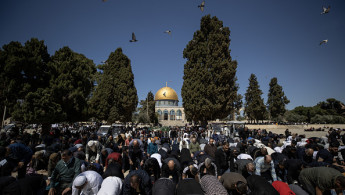Access to Jerusalem and Al-Aqsa mosque 'a dream' for Palestinians in Gaza
Due to an Israeli ban, accessing occupied Jerusalem and praying in Al-Aqsa mosque, one of the holiest Islamic sites in the world, continues to be a fantasy for the majority of Gaza's population.
Since the beginning of the first Palestinian intifada (uprising) in 1987, Israel set restrictions on Palestinians in Gaza from access to Jerusalem, further strengthening restrictions after the launch of the second intifada in 2000.
Based on the Israeli incapacitating requirements, only men aged 55 years and over and women aged 50 and over can get exceptional permissions to reach Jerusalem and pray in Al-Aqsa.
Speaking to The New Arab, human rights activists and locals said that "such illegal restrictions have banned at least three Palestinian generations from their right to visit Al-Aqsa and perform their prayers inside it."
Ameer al-Nakhala, a Gaza-based man in his 20s, expressed sadness as he does not have any hope to access Al-Aqsa, which most foreigners can do.
"I only heard from my parents and grandfather about Jerusalem, Al-Aqsa and most of the cities in the West Bank, but I have never visited them before as Israel deprives the young people of reaching our occupied territories," he said to TNA.
"It is illegal to live in the same occupied territories but cannot move freely between our provinces," he said, noting that he can only watch the prayer in Al-Aqsa via televised events, especially during Ramadan and Fridays.
"I heard that Israel will allow Gazans to pray in Jerusalem, but once I read its requirements, I believe that I have to wait for at least three decades to meet some of its conditions," he added.
Shady Safi, from Khan Younis city in southern Gaza, shared similar sentiments. He believed that travelling to any Arab or European country would be easier than reaching Jerusalem.
"Israel knows very well that we love Jerusalem and Al-Aqsa as a basic holy place for us as Muslims and Palestinians and it knows that if we reach there we will never leave anymore," the 30-year-old father of two said to TNA.
"For years, Israel is betting on making the new generations forget the Holy Lands and our rights to regain them and establish our independent state," he opined.
"However," according to Safi, "we are keeping our history, and all the Israeli restrictions and procedures will not prevent us from reaching Jerusalem someday. "
Earlier this week, the Israeli authorities claimed that it will allow hundreds of Gazans, who meet its requirements, to head to Jerusalem to pray in the Al-Aqsa mosque.
As a result, the Palestinian Civil affairs declared that it is ready to receive the applications from the residents in Gaza to send them to Israeli intelligence, which will issue the final approvals.
In a single day, at least 10,000 applications were submitted while the occupation will allow only 800 people to travel to Jerusalem during the holy month of Ramadan, according to a Palestinian official in Ramallah, who preferred anonymity.
Amina Nassar, a Gaza-based woman, was among those who applied their information to be allowed to pray in Al-Aqsa Mosque. However, she was not sure she'll achieve the dream she sought for more than 23 years.
"I hope to pray in our holy Mosque," the 59-year-old mother of eight told TNA. "I am afraid to pass away before reaching Jerusalem."
"The last time I prayed in Al-Aqsa was in 1986, and then all my attempts to visit Jerusalem failed," she added.
In a press statement sent to TNA, the Palestinian Center for Human Rights (PCHR) said, "The Israeli occupation practices a racist policy that prevents the Muslims of the Gaza Strip from exercising their right to freedom of worship by visiting Al-Aqsa Mosque."
"The recent Israeli decision to allow only about 800 elderly people to visit Al-Aqsa Mosque represents a continuation in denying Gazans the right to access places of worship," Fadel al-Muzaini, a director at the PCHR, told TNA.
"Allowing a small number of worshipers from Gaza to reach Jerusalem is considered a falsification of reality and an attempt to deceive the international community," al-Muzaini said. "Jews are allowed by Israel to storm Al-Aqsa Mosque."
"Freedom of worship is a right guaranteed by international human rights law, and it must be available to all individuals and not to a specific number," he stressed.
He condemned the international community for not pressuring Israel to stop its violations against the Palestinians in the occupied territories.




 Follow the Middle East's top stories in English at The New Arab on Google News
Follow the Middle East's top stories in English at The New Arab on Google News

![A group of Palestinians, foreign and Israeli activists gather to participated in an olive picking event on the land in the town of Battir, which is under threat of confiscation by Israel in Bethlehem, occupied West Bank on 8 November 2024. [Getty]](/sites/default/files/styles/image_330x185/public/2182930803.jpeg?h=199d8c1f&itok=__0LgGsa)
